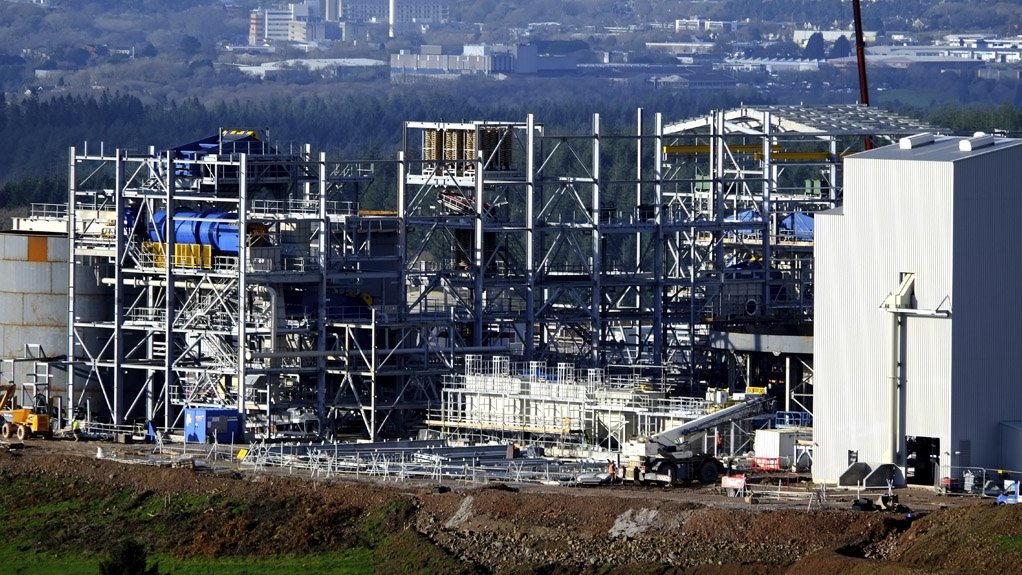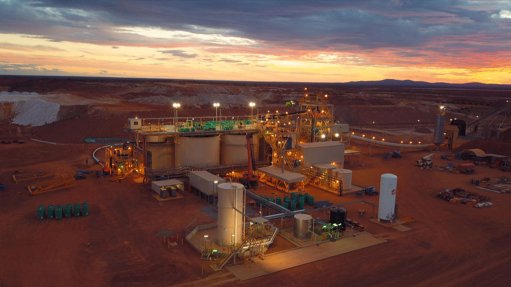Brexit to impact on UK mining sector, R&D to bear the brunt



SHINING LIGHT Wolf Minerals’ Drakelands tungsten and tin mine is one of only two mines outside of China with a production capacity of greater than 3 000 t/y of tungsten concentrate
MARK RACHOVIDES The effect of Brexit is more likely to be felt by global mining majors that are registered and/or headquartered in the UK, than by local mining operators
Following a referendum held in June 2016, in which a small majority of British voters declared that they were in favour of leaving the European Union (EU), the UK government has indicated that it intends, in the coming months, to invoke Article 50 of the Treaty on European Union, which is the formal procedure for withdrawing from the union.
The impact of the UK’s decision to exit the EU, commonly called Brexit, will have significant and far-ranging impacts on the UK’s mineral resources sector, particularly as UK Prime Minister Theresa May recently indicated that the UK intended withdrawing from the EU’s single market, says European metals and minerals mining representative body Euromines president Mark Rachovides.
The EU’s single market refers to the EU as one territory without any internal borders or other regulatory obstacles to the free movement of goods and services. The European Commission elaborates that the aim of the single market is to stimulate competition and trade, improve efficiency, raise quality and help cut prices across the EU.
Rachovides tells Mining Weekly that the UK’s coal industry is in decline, as the country’s electricity grid is increasingly more reliant on renewable-energy sources than it is on electricity generated from coal-fired power plants. An illustration of this can be seen in the UK government’s announcement in November 2016 that it intended to close all its coal-fired power stations by 2025.
However, Rachovides points out that the other segments of the UK’s mining industry, such as industrial minerals production, are well supported by local consumers. He highlights that the UK is also one of the largest producers of kaolinite, which is mainly used in the production of glossy paper and is the main component of porcelain.
Moreover, Rachovides says the UK has about 1 500 mines and quarries in operation employing about 30 000 people. “The UK also has two new, large mining operations, namely speciality metals producer Wolf Mineral’s Drakelands tungsten and tin mine, in southwest England, and fertiliser development company Sirius Minerals’ potash mine, in the North Yorkshire county of England, which indicates that there is still great potential for the UK’s mining sector,” he emphasises.
Drakelands is one of only two mines outside China with a production capacity greater than 3 000 t/y of tungsten concentrate, while Sirius Minerals reports that its potash mine will have an initial production capacity of ten-million tons a year of potash and at full production will produce 20-million tons a year of potash.
Rachovides explains that the UK’s mining industry has very different dynamics to other mineral resource sectors in the rest of the EU. There are a number of well known British mining companies that are headquartered in the UK and are listed on the LSE, but do not have mining operations in the country itself, whereas most other European mining firms have some type of operational footprint in the country where they are headquartered.
Therefore, Rachovides believes that the effect of Brexit is more likely to be felt by global mining majors that are registered and/or headquartered in the UK, such as BHP Billiton, Rio Tinto, Anglo American and Glencore. He explains that this is because these companies are supplying commodities (both raw and processed) to the EU – which is the largest consumer market for minerals worldwide – and they will likely be treated, regardless of where the commodity is produced, as British companies trading with EU-based entities.
Rachovides elaborates that the uncertainty surrounding how UK companies will do business with EU companies (as it is likely that imports from UK companies will carry tariffs and potentially even restrictions) could negatively affect existing and future mining offtake agreements that these global miners have or might have with EU companies.
Nonetheless, he emphasises that UK registered and/or headquartered mining companies should not panic, as it is unlikely that alternative mineral suppliers to EU-based companies will be found swiftly, which will ensure that these companies will remain suppliers of commodities to the EU at least in the short-to-medium term.
Rachovides remarks that the affected miners will be further disadvantaged as they will not be able to lobby through the UK government for improved operating terms within the EU and will have to directly lobby the EU itself or approach sympathetic EU member States.
“The question is, then: Would these companies consider deregistering in the UK and/or moving their operations elsewhere like some financial institutions have suggested they may do? This remains an open question.”
These issues ultimately form part of “broader structural matters” that will need to be addressed over the next two years, which is the period that the UK has to extricate itself from the EU, once Article 50 has been triggered.
Equipment and Services
Meanwhile, Rachovides notes that the UK has gone through a significant resurgence in its engineering sector in recent years, owing to its high-quality workmanship and emphasis on research and development (R&D).
However, he points out that much of this progress is attributable to the UK’s collaboration with EU research institutions over the past 40 years. “This networking of brain power and sharing of resources has been one of the most important advantageous aspects of the UK forming a part of the EU,” Rachovides highlights.
He states that Brexit will “undoubtedly” negatively impact on this R&D collaboration between European and UK institutions and could be “disastrous” for the UK’s ability to keep pace with international technological developments.
Nonetheless, he stresses that there will be ways for UK institutions to continue to work with their EU counterparts. However, Rachovides notes that British academia is already suffering, owing to the reduction in funding available for research. “This will likely only worsen once Brexit comes into effect, as funding from EU sources will not be readily available to UK institutions,” he laments.
Further, Rachovides warns that, once Brexit comes into effect, it will be significantly more difficult for UK equipment and service providers to work in the EU and cost-effectively supply goods or services, as there will likely be new tariffs and difficulties in attaining work permits to operate at mining projects in the EU.
Comments
Press Office
Announcements
What's On
Subscribe to improve your user experience...
Option 1 (equivalent of R125 a month):
Receive a weekly copy of Creamer Media's Engineering News & Mining Weekly magazine
(print copy for those in South Africa and e-magazine for those outside of South Africa)
Receive daily email newsletters
Access to full search results
Access archive of magazine back copies
Access to Projects in Progress
Access to ONE Research Report of your choice in PDF format
Option 2 (equivalent of R375 a month):
All benefits from Option 1
PLUS
Access to Creamer Media's Research Channel Africa for ALL Research Reports, in PDF format, on various industrial and mining sectors
including Electricity; Water; Energy Transition; Hydrogen; Roads, Rail and Ports; Coal; Gold; Platinum; Battery Metals; etc.
Already a subscriber?
Forgotten your password?
Receive weekly copy of Creamer Media's Engineering News & Mining Weekly magazine (print copy for those in South Africa and e-magazine for those outside of South Africa)
➕
Recieve daily email newsletters
➕
Access to full search results
➕
Access archive of magazine back copies
➕
Access to Projects in Progress
➕
Access to ONE Research Report of your choice in PDF format
RESEARCH CHANNEL AFRICA
R4500 (equivalent of R375 a month)
SUBSCRIBEAll benefits from Option 1
➕
Access to Creamer Media's Research Channel Africa for ALL Research Reports on various industrial and mining sectors, in PDF format, including on:
Electricity
➕
Water
➕
Energy Transition
➕
Hydrogen
➕
Roads, Rail and Ports
➕
Coal
➕
Gold
➕
Platinum
➕
Battery Metals
➕
etc.
Receive all benefits from Option 1 or Option 2 delivered to numerous people at your company
➕
Multiple User names and Passwords for simultaneous log-ins
➕
Intranet integration access to all in your organisation




















